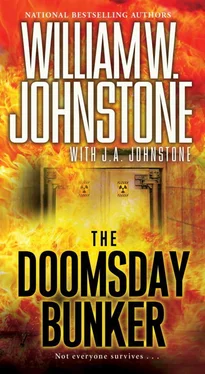“I don’t think it’s a bad idea,” Huddleston said. “Patrick explained everything to me in detail. Surely it wouldn’t hurt just to go take a look.”
Beth glared over at Larkin, who was sitting in a recliner across the living room from where the Huddlestons sat on a sofa, and said, “I think even considering such a cruel, callous thing coarsens our culture and harms the country’s collective consciousness.”
Larkin managed not to grimace, both at what Beth said and the way she said it, but he had to work at controlling the reaction. He’d had plenty of practice, though. He was, after all, white, straight, middle-aged, and retired military, to boot, which meant he was to blame for everything bad that happened anywhere in the world… at least in the eyes of some people.
“Look, it’s like having insurance,” Huddleston said to his wife, unknowingly echoing one of the arguments Graham Moultrie had used. “You don’t think having insurance is bad, do you?”
“It’s a manifestation of white privilege, but I suppose it could be considered a necessary evil.”
“And you’ve got to admit, with the way things are going—climate change, pollution, and all that—the world could be in for some rough times.”
Huddleston knew the right buttons to push, Larkin thought. Bringing up terrorism and rogue nations overseas wouldn’t do any good, because that would just prompt Beth to launch into a tirade about how all that was the fault of the United States and how the rest of the world would leave us alone if we would just leave them alone… while continuing to funnel billions of dollars of aid and outright payoffs to them, of course.
“I don’t think there’s anything wrong with trying to make sure that we survive, do you?” Huddleston went on.
“I suppose not.” Beth frowned. “But what about everyone else? How many people can this… shelter… hold?”
Huddleston looked at Larkin, who wished the guy had left him out of this discussion. Huddleston had insisted that Larkin come into the house with him, though, and help him talk to Beth. If it was a good cause—and Larkin truly believed that the Hercules Project was—then he supposed he had to try.
“The project is designed to support approximately four hundred people,” he said.
“Four hundred?” Beth stared at him, as obviously aghast as if he’d just taken a dump on their carpet. “Four hundred? What about all the millions of other people in this area?”
“Well, Beth, they won’t all fit in there.”
Her glare darkened even more. “Are you making fun of me, Patrick?”
“No, not at all,” he said. “It’s just a simple fact. The room for people and supplies is limited, and so is the capacity of all the equipment necessary to make those quarters livable. You’re talking about physics and math. You can’t make numbers stretch any farther than they do.”
“So everybody else except your select few can just die , is that it?”
“Nobody knows what’s going to happen. People just want to have a place to keep themselves and their families safe. That’s just human nature.”
Beth sniffed contemptuously. “Animal nature is more like it. And people should be trying to rise above that, not pander to it.” She looked at her husband and shook her head. “No, Jim, absolutely not. We won’t have any part of this, and honestly, I’m a little offended that you would even bring it up. I had a higher opinion of you than that.”
Well, that was pretty cold , Larkin thought. Huddleston looked like he might be used to it, though. He shrugged and said, “We can talk about it later—”
“No, we can’t.” Beth stood up. “I’m not talking about such a disgusting thing ever again.”
She stalked out of the living room, casting a glance at Larkin as she went out that told him very plainly he fell into that “disgusting thing” category.
It was good that he didn’t give a crap how Beth Huddleston felt about him, or he might have been offended.
“I’m sorry, Patrick,” Huddleston said. “I should have kept you out of it. She didn’t have to be so… so…”
“Don’t worry about it,” Larkin said, as much to save his neighbor from having to come up with an accurate word to describe his wife as any other reason. “Beth just has strong opinions, that’s all. Nothing wrong with that.”
“It’s nice of you to see it that way. I was hoping I could appeal to her logic. You actually can convince her to change her mind if you can point out logical reasons for it.”
Larkin couldn’t recall Beth ever changing her mind, or even modifying an opinion slightly, about anything, but he didn’t see any reason to mention that. He just stood up and said, “Hey, you gave it a try. That’s all you can do, right?”
“Maybe.” Huddleston frowned. “Maybe not. I’ll work on her.”
“Well, good luck.” Let the guy take that however he wanted to.
“In the meantime, I can go out there and have a look at the place myself, right?”
“I don’t see any harm in that.” As long as Beth doesn’t ’t find out about it, Larkin added to himself.
“There are still units available?”
“I’m pretty sure there are. The project’s getting pretty close to being finished, though. You’d have to come up with a big chunk of change in fairly short order, I think.”
Huddleston waved a hand. “Not a problem.” He laughed, but there wasn’t much humor in the sound. “Not compared to some I’ll have.”
* * *
Huddleston had his own problems. So did Larkin. The world might be falling apart, but he still had a book due. He retreated to his office every morning and afternoon to get some pages done, and the manuscript slowly progressed toward completion. It was a little difficult writing about super-competent characters who never seemed to have any trouble solving their problems when most of the time he looked at what was going on in the news and felt utterly helpless to change anything… but that was the nature of the game. Dramatic license, he told himself.
The death toll from the attack on the football game in Michigan leveled off at 937. Of course, there were still people in the hospitals who’d been critically injured and might still die. Some of the survivors were maimed for life, and it was unlikely that anyone who’d been in the stadium on that fateful Saturday afternoon would ever be the same. Larkin knew that if he’d been there, any time he heard an airplane he would start looking for cover. He supposed people who had been in Manhattan on 9/11 were the same way.
Nine-eleven seemed relegated to the dim, distant past now. Kids who hadn’t even been born then were adults. The attack that had seemed so horrifying, so beyond belief, was now only noteworthy because those who hated the United States hadn’t been able to achieve anything of quite the same magnitude again, although the mall bombing in Florida didn’t lag that far behind. It hadn’t been as visually spectacular, though.
But the hatred, the vicious lust to deal out death and suffering to innocent people… that was just commonplace now. People were still shaken when there was a new attack, like the one in Michigan, but then they shrugged their shoulders and asked what did anybody expect when the country had thrown itself wide open to welcome such killers, and then they went on about their business.
The New Normal. Larkin shuddered every time he heard that phrase, but he didn’t doubt its truth.
He was surprised to answer the doorbell one afternoon and find Jim Huddleston standing there. Huddleston looked excited and scared at the same time.
“I did it,” he said without waiting for Larkin to say hello or invite him in.
Читать дальше









